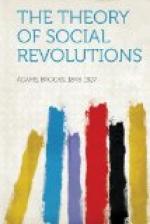True judicial courts, whether in times of peace or of revolution, seldom fail to be a substantial protection to the weak, because they enforce an established corpus juris and conduct trials by recognized forms. It is startling to compare the percentage of convictions to prosecutions, for the same class of offences, in the regular criminal courts during the French Revolution, with the percentage in the Revolutionary Tribunal. And once a stable social equilibrium is reached, all men tend to support judicial courts, if judicial courts exist, from an instinct of self-preservation. This has been amply shown by French experience, and it is here that French history is so illuminating to the American mind. Before the Revolution France had semi-political courts which conduced to the overthrow of Turgot, and, therefore, wrought for violence; but more than this, France, under the old regime, had evolved a legal profession of a cast of mind incompatible with an equal administration of the law. The French courts were, therefore, when trouble came, supported only by a faction, and were cast aside. With that the old regime fell.
The young Duke of Chartres, the son of Egalite Orleans, and the future Louis Philippe, has related in his journal an anecdote which illustrates that subtle poison of distrust which undermines all legal authority, the moment that suspicion of political partiality in the judiciary enters the popular mind. In June, 1791, the Duke went down from Paris to Vendome to join the regiment of dragoons of which he had been commissioned colonel. One day, soon after he joined, a messenger came to him in haste to tell him that a mob had gathered near by who were about to hang two priests. “I ran thither at once,” wrote the Duke; “I spoke to those who seemed most excited and impressed upon them how horrible it was to hang men without trial; besides, to act as hangmen was to enter a trade which they all thought infamous;




